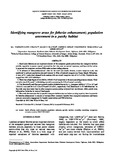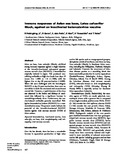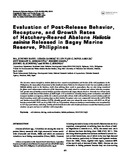Studies on the causative organism of Oreochromis niloticus (Linnaeus) fry mortalities I. Primary isolation and pathogenicity experiments.
Share
Abstract
Oreochromis niloticus fry reared in 50 L aquaria at a density of 1,000 fry manifested mortalities of 15% daily. Afflicted two-week old fry exhibited darker pigmentation, emaciation lesions, and surface swimming. Parasites and fungi were not observed upon direct microscopic examination of affected fry. Bacterial isolations from weak fry yielded the predominant growth of Pseudomonas sp. Subsequent pathogenicity experiments showed that Pseudomonas sp. is pathogenic at a dose of 10 super(7) cells/ml rearing water but not at a does of 10 super(6) cells/ml rearing water. By and large, the presence or absence of feed during infection did not affect virulence of the test bacteria. Antimicrobial sensitivity tests revealed sensitivity of Pseudomonas) sp. to Chlortetracycline, Colistin, Kanamycin, Oxytetracycline and Polymyxin B, and resistance to Nitrofurantoin and Sulfamethoxazole trimethoprim.
Description
SEAFDEC Contribution No. 211.
Suggested Citation
Lio-Po, G., & Sanvictores, E. (1987). Studies on the causative organism of Oreochromis niloticus (Linnaeus) fry mortalities I. Primary isolation and pathogenicity experiments. Journal of Aquaculture in the Tropics , 2(1), 25-30. http://hdl.handle.net/10862/1271
Subject
Collections
- AQD Journal Articles [1214]
Related items
Showing items related by title, author, creator and subject.
-
Identifying mangrove areas for fisheries enhancement; population assessment in a patchy habitat
Lebata, Ma. Junemie Hazel; Walton, Mark E.; Biñas, Joseph B.; Primavera, Jurgenne; Le Vay, Lewis- Small-scale fisheries are an important element of the ecosystem goods and services that mangrove habitats provide, especially to poorer coastal communities that rely most on natural resources, and have similar ...
-
Immune responses of Asian sea bass, Lates calcarifer Bloch, against an inactivated betanodavirus vaccine
Pakingking, Rolando V., Jr.; Seron, R.; de la Peña, Leobert D.; Mori, K.; Yamashita, H.; Nakai, T. (Blackwell Publishing, 2009)Asian sea bass, Lates calcarifer (Bloch), exhibited strong immune responses against a single injection of the formalin-inactivated red-spotted grouper nervous necrosis virus (RGNNV), a betanodavirus originally isolated in ... -
Evaluation of post-release behavior, recapture, and growth rates of hatchery-reared abalone Haliotis asinina released in Sagay Marine Reserve, Philippines
Lebata-Ramos, Ma. Junemie Hazel; Doyola-Solis, Ellen Flor C.; Abrogueña, Jeff Bogart R.; Ogata, Hiroshi; Sumbing, Joemel G.; Sibonga, Rema (Taylor & Francis, 2013)The lucrative returns brought by abalone fisheries have caused overexploitation and decline of the wild population. In the Philippines, the Aquaculture Department of the Southeast Asian Fisheries Development Center has ...





